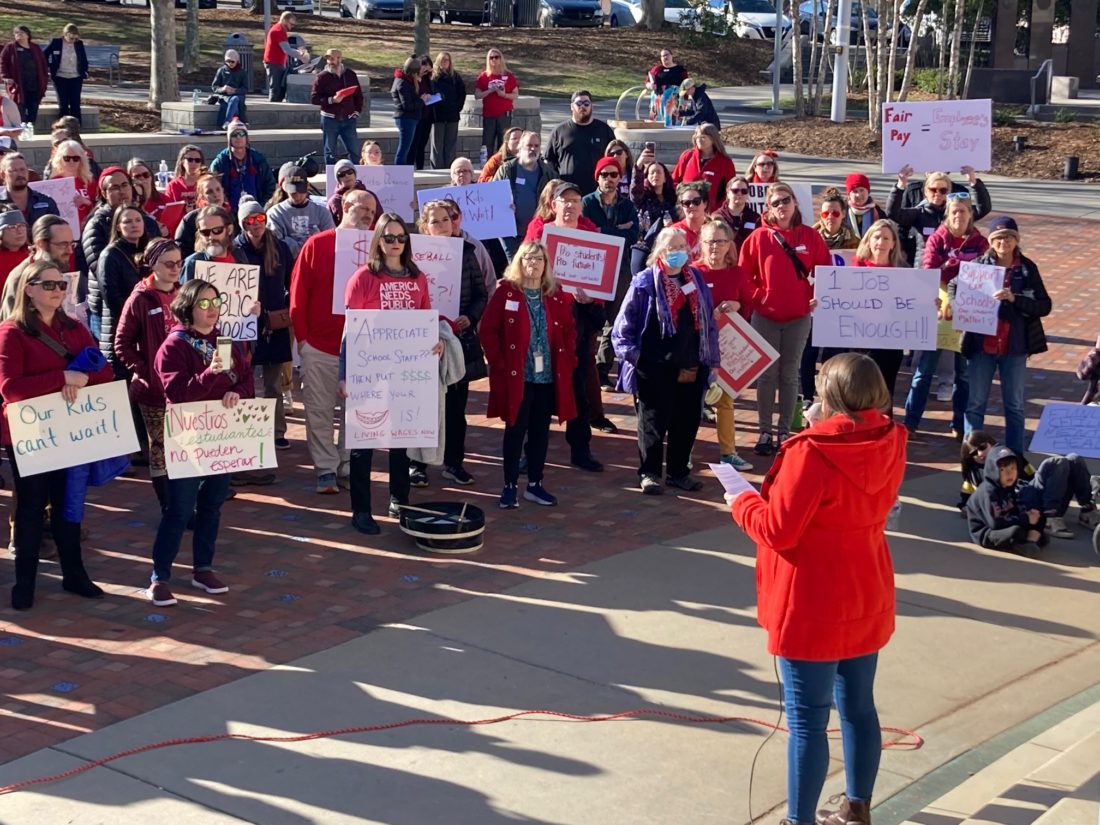Community conversations — both formal and informal — over pay for educators, equity for underrepresented populations and housing affordability abounded in Western North Carolina in 2023. Those issues, as well as nationwide inflation, underpinned any efforts to improve the quality of life for Asheville-area residents.
Early in the year, educators lobbied both state and county governments — with varying degrees of success — to adjust budgets so they can better afford to live in the same county in which they teach. Affordable housing advocates asked local governments to do more to increase housing stock.
On the topic of social and environmental justice, nonprofits pushed for a countywide single-use plastic bag ban before being stymied by a rule passed in the state budget, and the City of Asheville and Buncombe County continued the work of a Community Reparations Commission to explore ways they can make amends for decades of systemic racism.
These issues and more informed newsmakers’ reflections on quality of life in Xpress‘ 2023 Year in Review.
 How has your neighborhood changed in 2023?
How has your neighborhood changed in 2023?
“New, expensive houses have continued to be built in my neighborhood this year. My neighbors continue to live under the threat of the I-26 expansion project that will displace folks who’ve lived there for generations. [However,] the relationships that I have with my longtime neighbors continue to be strong and beautiful.” — Grace Barron-Martinez, activist and Realtor
“I live in Kenilworth Forest, and we had a small neighborhood-owned, city-managed park. Recently, the city [indicated] they would no longer maintain it. The neighborhood stepped up, and we now have a chair swing, pollinator garden and lots of park benches.” — Jessie Landl, executive director, Preservation Society of Asheville
“My neighborhood [in Enka] is like most in Buncombe County. We are experiencing the change in ownership from an older generation to a new, younger generation and seeing more nonlocal buyers as opposed to long-term locals with deep roots in the community. We welcome these new homeowners and share in their excitement. These young families moving into the neighborhood are seeking a community of families that share the same dream for the future.” — Keith Miller, tax assessor, Buncombe County
“I live in West Asheville and have noticed an increase in families with children moving into the area. Earlier in the year, homelessness, panhandling and theft were very prevalent. As of late, I have noticed a reduction in homelessness activity as well as panhandling. I have also noticed an uptick in homeless services within the community, which has helped with the overall challenges.” — Sandra Kilgore, Asheville vice mayor
“I’ve watched the affordability drastically change in my neighborhood, [and] with rising costs of basic necessities, it appears that needs for feeding programs, housing, heating and broadband are growing all around.” — Sara Nichols, regional planner, Land of Sky Regional Council
How has the local economy affected you, the broader community or both in 2023?
“I pinch my pennies. But I notice that fees are going up faster than my Social Security check. I have some savings I regularly dip into. Many people who live in the Vanderbilt [Apartments for senior citizens] like me, however, have no savings to fall back on. But we often help each other out.” — Rachael Bliss, author and community activist
“With the amount of [tourism] dollars that come into Asheville on a yearly basis, I feel that we could provide more opportunities for individuals and families to thrive. The development of a strong workforce with living-wage salaries and affordable housing is a start.” — Michael Hayes, executive director of Umoja Health, Wellness and Justice Collective
“The local economy has been good for the travel industry. Unemployment is low, and discretionary income is being prioritized for travel. Within our industry, wages are stronger than they’ve ever been, which is good for employees. However, again, the price of housing in our local market continues to be challenging.” — Lew Bleiweis, president and CEO, Greater Asheville Regional Airport Authority
“I work for Buncombe County Schools and have not seen a significant raise in my wages in many years. As the cost of utilities, food and housing have increased, as well as interest rates, I have trouble buying basics like groceries and am constantly behind in paying for after-school care for my children and fixing my car. As I read my local parenting forums, more and more moms are posting daily for help with food, formula, how to get rental assistance and seeking better-paying jobs to support their families. Many moms express burnout, depression and hopelessness as we approach the holidays and nothing seems to be getting better. The disproportionate inflation in Buncombe County is real.” — Joan Hoffman, teacher, A.C. Reynolds High School
“Locally, as it is nationally, prices are going up. Rather than buying less, I focus on buying smarter and more efficiently. But I also make sure there’s room in the budget for fun and adventure.” — Matthieu Rodriguez, marketing manager, Harrah’s Cherokee Center – Asheville
What did our local governments get right in 2023 regarding the environment?
“Asheville and Buncombe County’s push to ban plastic bags was absolutely the right policy, but the N.C. Retail Merchants Association and N.C. General Assembly, representing big retailers like Ingles and Walmart, decided it knew what was good for our community [better] than we did. That was despite overwhelming support from businesses and the public for this policy. But we aren’t giving up our effort to reduce plastic pollution.” — Hartwell Carson, French Broad riverkeeper, MountainTrue
“A brilliant move is supporting the AVL Unpaved projects. They encourage walking, biking and hiking instead of using our personal vehicles, and give us all access to many of the places we would like to [go] without requiring the use of our cars and thus minimizing the damage to our mountains [in a] cost-effective way.” — Morgan Albritton, owner, Morgan’s Comics
“Maintaining and restoring our tree canopy solves multiple problems. It’s our greatest tool for addressing flooding, the heat-island effect, air quality and resilient green spaces for human and natural habitats. Thanks to recommendations by our Urban Forestry Commission and community organizing efforts, the City of Asheville responded to research regarding our declining tree canopy by hiring the city’s first urban forester and budgeting for an Urban Forestry Master Plan that prioritizes partnership.” — Kim Roney, Asheville City Council member
“I’m heartened by the adoption of electric vehicles in local government fleets, even though supply-chain issues have slowed the process. The Merrimon Avenue road diet has been a blessing for [the environment in my neighborhood]. Noise levels have decreased dramatically, even before accounting for the reduction in screeching collisions. It’s a far safer, more pleasant place to walk and drive now.” — Dave Erb, member, Blue Ridge EV Club
What changes in education in 2023 have benefited or disadvantaged local students?
“Traditional education is under attack. … If public schools are important to a vibrant community, then we need to prioritize ways to recruit and retain the people who make these schools strong. What we pay the folks who work with our children is embarrassing.” — Lissa Pedersen, teacher and vice president, Buncombe County Association of Educators
“In 2023, Buncombe County Schools experienced enrollment growth and a stabilization of the faculty. Both of these metrics point to increased satisfaction with the teaching and learning environment in our schools and have resulted in substantial increases in academic results for students across the school system.” — Rob Jackson, superintendent, Buncombe County Schools
“K-12 education is heading toward increased segregation along socioeconomic and racial lines as affluent families leave public schools for charter and private options. The “school choice” movement (House Bill 823) is sorting students into “haves” and “have-nots.” These changes paint a future where students go to school with classmates that increasingly resemble themselves, undermining the community-building potential of public education.” — Brooke Heaton, web architect
“[This year] has been a time of both benefits and disadvantages for local students. This past year, while both the General Assembly and the Buncombe County Commissioners approved millions of dollars of extra funding for schools, the General Assembly also passed the “Slate of Hate,” three laws that affect all students negatively but affect LGBTQ+ students even worse.” — Timothy Lloyd, school custodian and president, Asheville City Association of Educators
What has the community gotten right in regard to promoting equity and inclusion?
“The passion I’ve seen people acting on for the greater good of the community is something that we’re getting right. There’s been consistent energy put toward taking to the streets, to social media and to City Council to make the changes that we need to see in our community and to educate others on inequities being experienced here. Keeping those conversations going and continuing to make connections is, in my opinion, the most important part.” — Allie Daum, senior at UNC Asheville
“The single most important thing the community has gotten right was to open honest dialogue to address some of the painful truths that many have chosen to ignore. The establishment of the [Community Reparations Commission] and full staffing of the [City of Asheville’s] Office of Equity & Inclusion were major steps. However, there is much more to be done to address the many challenges that are on the horizon. Community engagement has increased significantly to include input from those most impacted.” — Sandra Kilgore
“I think it is a ‘step forward, step back’ situation. More local institutions are hiring people with lived experiences related to the work and this region to lead efforts. However, if a board or staff doesn’t trust a leader’s way of leading because it is different from their conceptualization, they can do harm. Inclusion and equity need to go beyond seats at the table — to gathering and acting in new ways.” — Ameena Batada, co-director of the master of public health program and professor of health and wellness at UNC Asheville
“Our Pride Festival’s success warms the heart, but needing extra security this year leaves me wondering. Neglecting to promote equity and inclusion puts our diverse community at risk in safety, health care and education. And I mean people of all genders, orientations, religions, etc. Silence ain’t just quiet; it’s deadly. If we don’t speak up and define what equity and inclusion mean, and act on making it happen, there may not be much of it left.” — Divine, producer, Bearded Lady Productions






Before you comment
The comments section is here to provide a platform for civil dialogue on the issues we face together as a local community. Xpress is committed to offering this platform for all voices, but when the tone of the discussion gets nasty or strays off topic, we believe many people choose not to participate. Xpress editors are determined to moderate comments to ensure a constructive interchange is maintained. All comments judged not to be in keeping with the spirit of civil discourse will be removed and repeat violators will be banned. See here for our terms of service. Thank you for being part of this effort to promote respectful discussion.